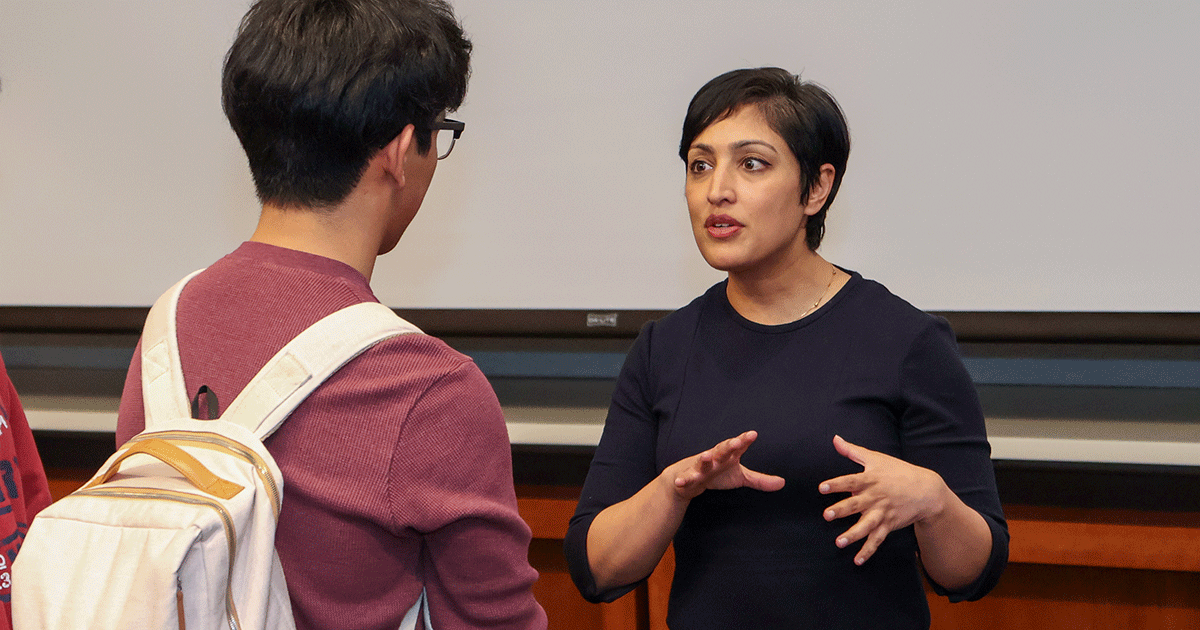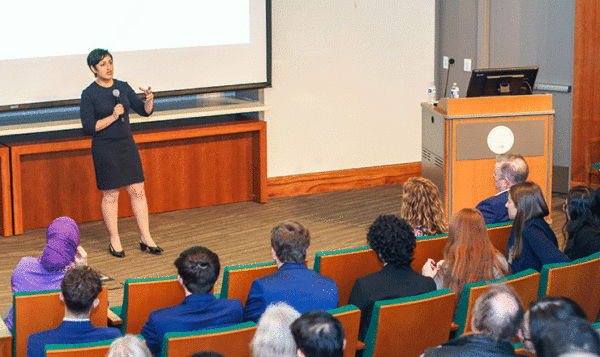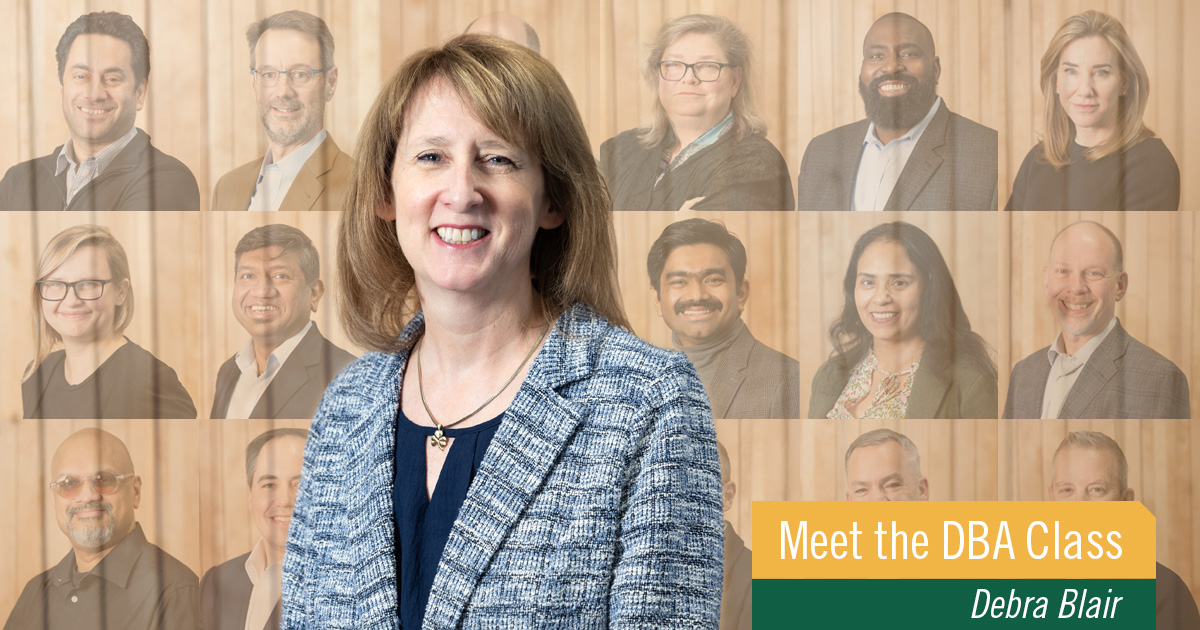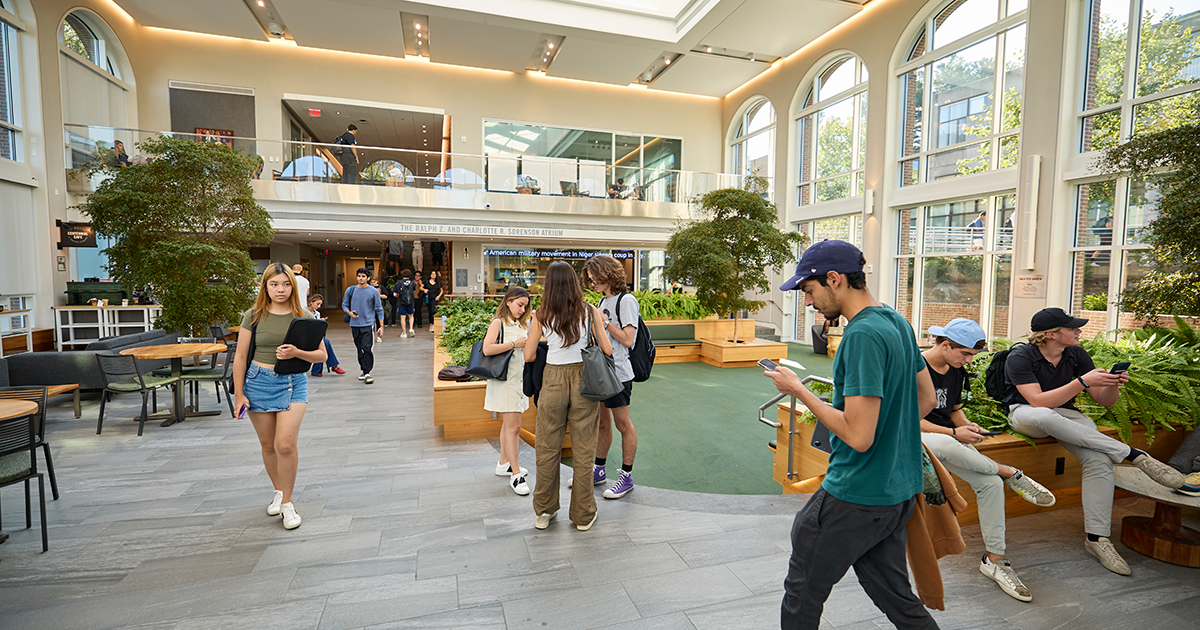AI Expert Rumman Chowdhury: ‘I Am an AI Optimist’

When Rumman Chowdhury, an expert on artificial intelligence, speaks at colleges, the students can seem a bit anxious, especially undergraduates.
With graduation looming, they’re wondering about AI and what it will mean for their careers. “I find undergrads to be the most concerned about the future,” Chowdhury said, “asking questions like, what are we going to study? What are we going to do if everything will be automated away.”
Chowdhury, however, is not someone filled with doom and gloom about AI. Forbes labeled her one of five people “Building Our AI Future,” and the U.S. Department of State recently named her a U.S. Science Envoy for her work in AI. “I am an AI optimist,” said the author and data scientist, who runs Parity Consulting, which focuses on the ethical use of AI.
Last week at Babson College, Chowdhury spoke before a packed crowd of students, faculty, and staff at Olin Hall’s Winn Auditorium. Among many topics, she spoke on jobs and how she doesn’t expect AI to cause widespread automation. AI could have a significant impact on work, but it will be more akin to a tool, something that may assist with tasks such as email and scheduling. “We are going to see a bit of disruption, but I really do see it as augmentation,” she said. “Some jobs are at risk. Not all jobs are at risk.”
That’s not to say there isn’t much work to do to ensure that AI works properly and that its full potential to benefit society is realized. At Babson, Chowdhury discussed the state of AI, its challenges, and its promise. Here are three key takeaways from her talk, which was presented by Babson’s Butler Institute for Free Enterprise Through Entrepreneurship.
1. Good Design Is Essential
ChatGPT caused quite a stir when it was launched in late 2022. Social media filled with enamored people trying it out, and news outlets filed many articles pondering the program’s implications.

The technology, however, wasn’t new. Why did this particular launch grab so much attention? Chowdhury credits the simple and familiar design of ChatGPT’s interface. “It took it and put it into the palm of your hand on your phone or on your screen in a way that was designed to look like text messaging,” she said. “The normalization of it is what helps it to be more widely adopted.”
The design also made the program seem intelligent, with three dots appearing when ChatGPT was processing a request, as if it was thinking. “It’s meant to make you think it’s alive,” Chowdhury said.
Such smart design is critical for any new technology. Chowdhury recalled how unfamiliar and off-putting the first electric cars looked. “They were designed like weird space cars, and then nobody wanted them,” she said.
2. The Trough of Disillusionment
Lately, some of that excitement about AI, unleashed by ChatGPT’s launch, has waned. The technology is far from perfect and can be erratic, biased, and ineffectual. Strange stories have surfaced, for instance, of a grocery chatbot creating a poisonous recipe, a car dealer’s chatbot selling a car for $1, and a New York City chatbot encouraging small business owners to break the law.
As AI loses some of its luster, the technology may be entering what is known as the “Trough of Disillusionment,” a term referring to the lowered expectations and cold reality that follows the initial buzz of emerging technology.
In short, the hype may be over, and Chowdhury considers that a good thing. The people working on AI now aren’t interested in glory. They’re interested in the work. “The Trough of Disillusionment is my favorite time,” she said. “There is no hype. You’re not going to get on the cover of Wired magazine, right? You’re only in that room now because you want to build.”
3. More than a Party Trick
For AI to be adopted more widely, it needs to work properly, have extensive oversight, and evolve beyond being a “party trick,” Chowdhury said. That means no strange outcomes and none of the racial and gender biases that so often plague it. “No company wants to build a product utilizing something that doesn’t work,” she said.
Advances are happening in some areas. One of those is weather prediction, which is important given how the weather is becoming more extreme due to climate change. Advanced AI models, Chowdhury says, can detect hurricanes more than a week in advance, giving a critical advance warning at a time when storms are growing stronger and more unpredictable. “That extra time for people to evacuate … literally will save lives,” Chowdhury says.
“We are going to see a bit of disruption (with AI), but I really do see it as augmentation. Some jobs are at risk. Not all jobs are at risk. ”
Rumman Chowdhury of Parity Consulting, which focuses on the ethical use of AI
Chowdhury emphasizes that such societal benefits from AI don’t just happen. Weather prediction, along with medicine and education, are all areas that have seen progress, but that’s only because an effort was made to make that occur. “So many amazing ways that AI is being used for today, but all of it is intentional,” she says
Often, people float lofty hopes for AI. “I heard so many CEOs say things like AI will cure poverty, and I asked how.” Billionaires can cure poverty now without AI, she argues, but they choose not to do it.
“AI is not going to cure poverty,” Chowdhury says. “People deciding to use AI for that reason will cure poverty.”
Posted in Insights




